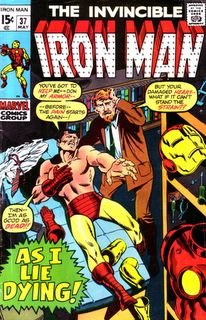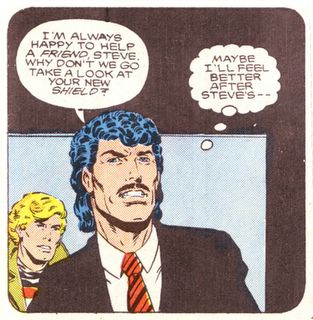 Iron Man
Iron Man was the character most affected by Stan Lee's
early flirtation with right wing politics. Lee gave Tony Stark a set of personality attributes so dislikeable that I can't understand how they could have been thought of as heroic. Consider:
He was an arms manufacturer. Given he had to make a suit of electronic armour, it did make sense to have Tony Stark work in one of the most morally-dubious professions, but it was the Cold War and early Vietnam which made this choice possible. Arms manufacturers were patriotic heroes fully signed up to the fight against godless Communism and not, say, professional murderers.
He was an industrialist. Subtly different, he was running a company which, when environmentalism gained ground as a political force, would clearly have some questions to answer about pollution and its contribution to global warming.
He was stinking rich. Never the most lovable attribute, and not one to make you feel especially sympathetic when he was having emotional difficulties
bedding his secretary.
He was a womaniser. I suppose Stan Lee must have had the now ultra-sleazy
playboy caricature in mind when he gave Stark his reputation for seduction. Apparently this was admired in the early sixties, but it's now more likely to be regarded as a sign of a pathological hatred of women.
These negative attributes are perhaps the reason why
Iron Man has flip-flopped so much over the years. Numerous writers have struggled with this character who
Doppelgaenger cruelly but accurately describes as "
the lame drunk Marvel one". While Iron Man could be heroic, writers adopted strange contortions in order to redeem Tony Stark.
First to go was the arms manufacturing. Stark had a fit of conscience, and got out of the killing business. At one point, he became a leader of the opposition in his own company, trying to stop nasty board members from pitching Stark International back into its old ways. Believable? Hardly.
Once pollution became an issue in the early seventies, we had a very strange story where Stark had a meeting with fellow industrialists where he tried to persuade them to adopt environmentalism after Namor had caused a major incident by smashing a polluting oceanic outlet pipe. I was left wondering why Stark didn't put his own house in order rather than talking to other companies. Not to mention his habit of jetting off for a party in Monte Carlo every time a writer was looking for a story introduction.
Therapy culture became big in the 1970s and, in one of the most convincing plotlines Marvel ever came up with, Stark became an alcoholic, simultaneous resisting both S.H.I.E.L.D. plans to take over Stark International (back into the arms' business, obviously) and the allure of a bottle of 18 year old McTickle's Glenseizure Scotch Malt. He also met Bethany Cabe, the only woman Stark ever looked vaguely like settling down with. Womanising just never became unacceptable enough to change that part of Stark's behaviour.
In the eighties, after an endless second battle with the bottle, Stark (having unconvincingly and carelessly managed to lose all of his old multi-billion dollar corporation) headed off to California to start a new, exciting, dynamic company up. This was a quite successful attempt to make Stark's business activities look exciting, dot.com a decade early, but was somewhat marred by the worst mullet ever to appear in four-colour format.

In the nineties, well, Marvel had a corporate nervous breakdown and nothing made sense any more. Two words: Teen Tony.
After an amazing escape from cancellation,
Iron Man settled down into a pleasant mediocrity, but nothing amounted to much until after 9/11. In a brave-but-foolish plotline, Stark became Defence Secretary (Americans, please forgive me if I can't remember his exact title) in Bush's administration, making the startling and unlikely promise that his technology could stop anyone ever dying in war. Disingenuously brushing aside the question of how he could hold such a position without being an ideologically committed neocon, we, and the writers, were left to puzzle out how Stark could be a full-time politician and Iron Man simultaneously.
All this fascinating silliness ended with the
Disassembled storyline, when
Iron Man was handed over to Warren Ellis and Adi Granov on the understanding that they would produce an issue without fail every single blue moon. By the time an uninspired relaunch had petered out, Marvel, in its
Civil War storyline, is again starting to make good use of Stark, as they show him for what he is: a ruthless businessman who, if his interests are threatened, will suck up to the powers-that-be until he runs out of slurp. Despite the alarming sight of Peter Parker becoming Tony Stark's mini-me, it's the best portrayal of Stark in years. Pity it's taking place in the
Avengers, and not
Iron Man.






